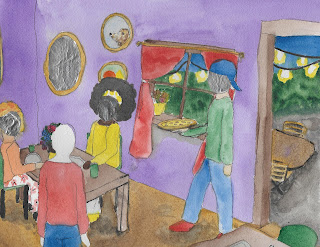In The Academic and Social Value of Ethnic Studies, Christine E. Sleeter argues that ethnic studies are essential to engaging the diverse population of learners in the American schooling system.
Early on, students of non-European ethnicity notice that they are not reflected in the narratives and materials presented to them. The primary voice in classrooms reflects a Euro-American view of history and values, underplaying the histories and roles of other ethnicities. Students who are not represented by this viewpoint turn to their communities to fill in gaps in these histories, but schools should be supporting these quests for clearer knowledge, not brushing them aside. Students orient their understanding in relationship to their experiences, and we ignore this to our mutual detriment.
It's not possible for one voice to represent everyone.While the Euro-American perspective isn't all wrong, it is just one side of a story, and it is always limited by its perspective. True diversity needs to mean lifting up voices, not just on special occasions, but as a daily practice. Lip service to the benefits diversity is not enough. In order for society to benefit from all the different kinds of voices and strengths in our community, there needs to be authentic support and perspectives need to be held together to create a clearer picture. How to do this is challenging: there are 180 days in the school year, and standards that have to be taught and tests prepped for. But ignoring the introduction of different voices comes at too great a cost to throw in the towel instead of looking for creative solutions.
One of the most tangible benefits of strengthening these voices in schools is authentic scholar engagement. When student's communities, histories, and voices are included in curriculums, their learning connects to their context and holds meaning. Students don't have to ask "when will I ever use this?!" because it exists in a context where its use is clear. It helps them to understand themselves in a wider context and to understand others. This relevance increases the motivation to learn and gives students a reason to be in school that is much clearer than a hypothetical future job.
Showing students we see the "me"(a concept discussed by Armstrong and Wildman) in them contributes to their motivation to learn, their connection to topics, their relationships with themselves, and their community with each other. This models the kind of society most wish to see, where each person is visible and their contribution is meaningful. It pushes back on color blindness as repudiated by Armstrong and Wildman and instead values each voice for its unique experience and insight.


.jpg)



Abi this is so well said. This is something more people should read and I love how you speak on being more invested in what you identify with. We are naturally compelled to exceed when we see the oath others have taken before us it is motivational. All people want to have pride in what they do it is a natural human instinct to want to do your best where we go wrong is when we start to compare. We can all have the best of different things and still be of great value in different ways. Education should teach us to idolize different avenues to a finish goal. So many of us see the problem yet we are not in the right positions to stop the wreckage. It is very discouraging and that might be the exact point they are trying to break the momentum. discourage the progress before it takes the next step. A black president and black female vice president of no we got to stop this DEI stuff now!
ReplyDeleteAbi, when you stated, "When students' communities, histories, and voices are included in curricula, their learning connects to their context and holds meaning." This resonated with me; that's one of the reasons I love Leslie's classes - she teaches about real-life concepts that apply to all ethnicities. I shouldn't have to wait until college to learn about my culture in school. I feel that the teachers who educated me glanced over slavery, and that's about it, so sad.
ReplyDeleteAbi, great connection to students seeing the “me” that was presented in Armstrong and Wildman. I do thing its important to have that connection. I know personally in terms of academics, if I dont feel its pertinent I can sometimes check out and have a hard time internalizing it. What fun is it learning something you have no connection to.
ReplyDelete"Showing students we see the "me"(a concept discussed by Armstrong and Wildman) in them contributes to their motivation to learn, their connection to topics, their relationships with themselves, and their community with each other." THIS!!! Speaking from experience students are highly engaged when they can find a point of connection in a lesson or the curriculum. When things feel external to them or foreign they are quickly disinterested.
ReplyDeleteExcellent: "While the Euro-American perspective isn't all wrong, it is just one side of a story". DO you know the Ted Talk "The Danger of a Single Story?" You would like it!! Maybe I will show it in class.
ReplyDelete